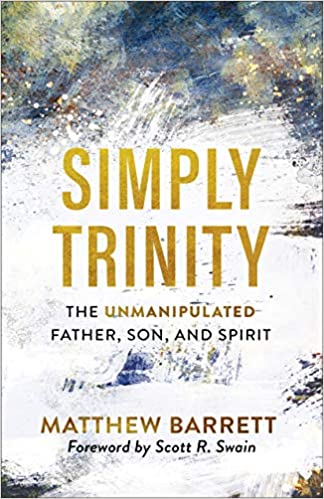A Book Review from Books At a Glance
By Fred G. Zaspel
As a young student in Systematic Theology class, I was taught the doctrine of the Trinity according to the simple familiar formula – there is one God, three persons are God, these three are distinct from one another – with proof-texts for each point, and so on. Helpful as this may be up front, if left to itself it leaves important questions unanswered, and it wasn’t until later that I began to learn of concepts of eternal generation, procession, relations, personal properties, inseparable operations, and such.
Matthew Barrett observes that this has been the experience of students of theology, broadly speaking, for the last century or so. So he writes his newest book to fill that gap in theological studies. Yet he is intent to note that what he has to offer is nothing new; indeed, he is eager to introduce us to the church’s earlier theologians, particularly of the fourth but also the fifth centuries. Such “retrieval” is all the rage these days, and in many ways, Barrett provides a model of how it can be done effectively. And in doing this he seeks to restore a more full-orbed biblical doctrine of the Trinity.
Barrett’s explanations of theological concepts that are relatively foreign to students of recent decades are excellent. His grasp of doctrines such as the eternal generation of the Son, the procession of the Spirit, inseparable operations, and divine simplicity, and the importance of all these to the doctrine of the Trinity, is firm. He writes engagingly, and he communicates these truths with ease and helpful clarity. His presentation of the trinitarian controversies of the fourth century is likewise clear and to the point. Early on in the book, the reader is well on the way to a closer understanding of these doctrines that, despite their lack of attention in recent years, are so essential to biblical trinitarianism. You’ll go a long way before you find a clearer presentation of these important concepts, particularly on a popular level.
Moreover, his zeal for demonstrating the importance of these truths with regard to the gospel, God’s purpose of salvation, and worship is contagious. These doctrines are not at all the irrelevant theories of ivory tower theologians – they are truly Christian essentials. And there is definitely a preacher inside Barrett eager to proclaim these truths. Whatever “dry theology” is, you don’t find it here. My experience, like Barrett’s, testifies that the doctrine of the Trinity has needed “retrieving,” and Barrett does it very well.
Barrett’s goal is not just to expound the doctrine of the Trinity but, in doing so, to expose and discredit various distortions of the Trinity in vogue today, distortions that inevitably arise in the absence of Nicene awareness; hence, his subtitle: The Unmanipulated Father, Son, and Spirit. Jürgen Moltmann, Hans Frei, and such, are in his sights, but especially the advocates of Eternal Functional Subordination – “ESF,” as it is often referred to. He argues that these “manipulations” are influenced more by contemporary redefinitions of Trinity and “person” in social and psychological categories than by the profound self-revelation of God in the gospel as interpreted by the Nicene fathers. The Nicene understanding of eternal relations is necessary to explain just how God is one in essence and three in persons, and it exposes the flaw of these contemporary alternatives.
In my first draft of this review, I complained that Barrett’s argument lacked a robust exegetical grounding. This is my complaint generally with regard to “retrieval” theology today – the attempt to reach back to the fourth century is indeed helpful, but the reach often stops short, failing to extend further to the first century and the apostles. On further reflection, I decided that in this case my complaint was overstated. Barrett warns against a mere proof-texting in favor of the deeper currents of trinitarianism found in God’s self-revelation in the gospel. And he does, in fact, offer usually brief but often insightful observations from most of the important trinitarian passages. And his argument that the economic Trinity reflects the immanent Trinity is excellent, even if lacking some of its New Testament echoes. And the exegetical work he does offer is not up front, leaving the theology rather not well-grounded for a time. What is fair to say is that Barrett’s orientation throughout is Nicene, and that is what stands out.
Barrett’s most extensive exegetical work appears in the latter half of chapter 8 – the longest chapter of the book – his critique of Eternal Functional Subordination. In my estimation, Barrett seals up the argument tightly and persuasively. The earlier part of the chapter, however, struck me as unnecessarily personal in his attack on Bruce Ware. Barrett has a series of brief video lectures to accompany the book, and in his lecture on chapter 8 he makes his point as effectively but more winsomely.
Perhaps the two leading strengths of this book are these. First, theologically it is clear and cohesive, and yet robust. Barrett understands the logic of Christian trinitarianism well, and he expounds and applies this great mystery consistently and with holistic insight. The concepts are profound – every time we enter this study we recognize that we are in over our heads. But Barrett makes it all as accessible as I’ve seen anywhere. Second, with this fuller understanding of the Trinity in mind, Barrett cuts off today’s varied forms of social trinitarianism at the roots. In these ways, his book does us a great service.
Fred G. Zaspel is Executive Editor here at Books At a Glance. He is also one of the pastors at Reformed Baptist Church of Franconia, PA, and an Adjunct Professor of Theology at STBS.
